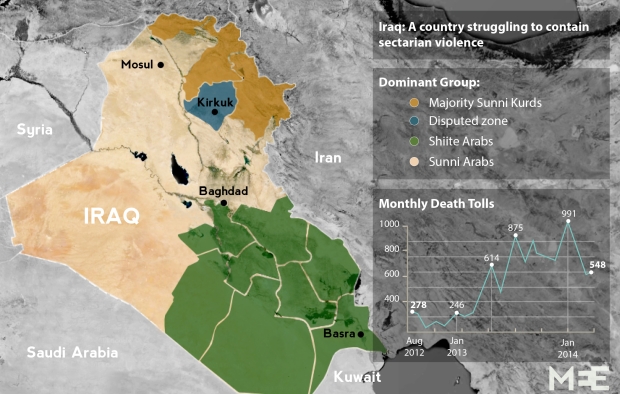Iraq's Maliki calls for inclusive new government

Iraq's new government should be an inclusive coalition that favours no religious, ethnic or sectarian group, incumbent Prime Minister Nuri al-Maliki said on Wednesday.
The cabinet should comprise representatives from every segment of the society and it should be every citizen's government, Maliki said during his first weekly speech after last week's parliamentary elections.
He said many problems were awaiting the new government, including rows over disputed territories and oil issues with the Kurdish regional administration in the north.
Frequently accused by both Shiite and Sunni groups of authoritarianism, Maliki's latest address is considered a call to all political sides for reconciliation.
Analysts say Maliki has adopted a moderate stance in order to ease the formation of a government.
Stay informed with MEE's newsletters
Sign up to get the latest alerts, insights and analysis, starting with Turkey Unpacked
Following a 2010 vote, it took eight months for the country to form a government.
Despite security threats, more than 12 million Iraqis went to the polls on April 30. The voter turnout was an unexpectedly high 60 percent.
Official results are expected to be announced on May 25.
Maliki is seeking a third term in office, but faces fierce opposition, with sectarian bloodshed at its most intense in more than five years.
These are Iraq's first parliamentary elections since the withdrawal of foreign troops three years ago.
Low turnout amongst Turkmens
Only half the eligible Turkmen population were able to cast their votes, said a Turkmen lawmaker.
Aydin Marouf said the voter turnout was 70 percent in Kirkuk, but only 55 percent nationwide due to the security situation.
"The turnout was low in Mosul and the predominantly Turkmen-populated town of Tal Afar due to insecurity, which had a bad impact on Turkmen," he said.
The vote took place amid myriad security challenges.
The United Nations said 2013 was the deadliest year in Iraq since 2008, with more than 8,800 people killed, most of them civilians.
Iraqi army shells Fallujah
At least seven civilians were killed and 45 injured on Wednesday when the Iraqi army shelled several areas of the restive city of Fallujah, a medical official has said.
The people were killed and injured when various parts of the city were struck by army mortar fire, hospital spokesman Wessam al-Essawi told Anadolu Agency.
Military officials could not be reached for comment.
Since last December, the Iraqi army has waged a major offensive in the Sunni-majority Anbar province with the stated aim of flushing militants - who Baghdad claims are linked to Al-Qaeda - out of the key cities of Fallujah and Ramadi.
Hundreds have been killed and injured in the two cities since the offensive began, according to government officials.
Many local Sunni tribes opposed to Iraq's Shiite-dominated government, meanwhile, have continued to voice anger over the operation's mounting civilian death toll.
Middle East Eye delivers independent and unrivalled coverage and analysis of the Middle East, North Africa and beyond. To learn more about republishing this content and the associated fees, please fill out this form. More about MEE can be found here.





